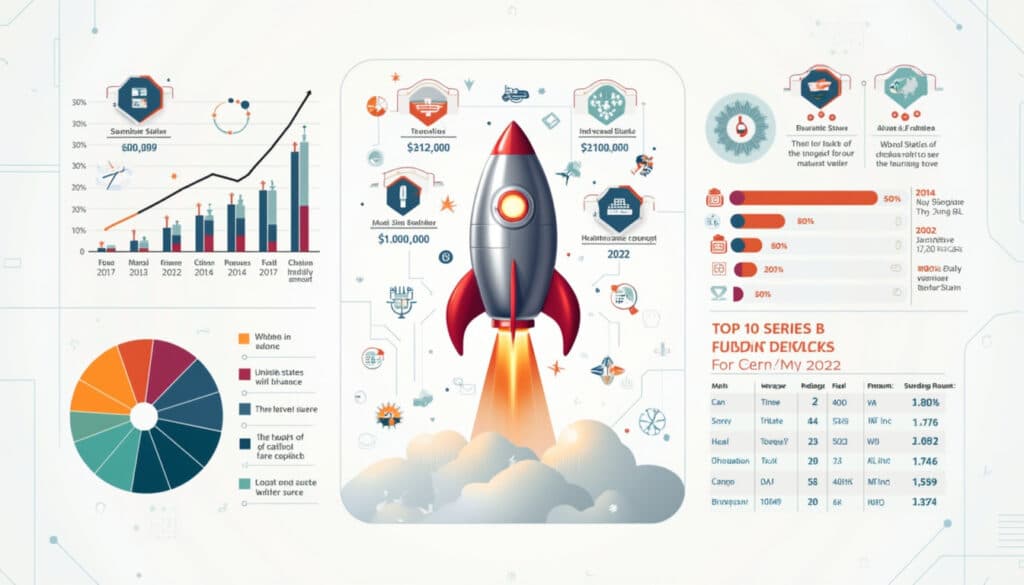Investing in private equity and venture capital opens doors to promising returns.
These funds support innovation and energize the entrepreneurial ecosystem.
Let’s explore why these investments deserve your attention.
Navigating the complex world of investments can seem daunting, but venture capital funds offer unique opportunities. By supporting innovative start-ups, these funds play a crucial role in transforming ideas into tangible successes. Moreover, they allow investors to diversify their portfolios while participating in economic growth. Despite certain risks, potential returns can be substantial, especially in a dynamic market. Recent changes in interest rates also influence wealth strategies, making these funds even more attractive. Finally, the European venture capital landscape shows signs of renewal, promising a favorable future for savvy investors.
Private equity funds stand out for their ability to inject capital into growing businesses. Unlike traditional funds, they often favor minority investments, leaving operational management to the historical leaders. This approach fosters close collaboration, where the expertise and network of investors support companies in their development. In Europe, although the average size of funds is smaller than that of the United States, recent adjustments indicate a trend toward consolidation and increased performance.
With the decline in interest rates, investment strategies are evolving. Euro funds, formerly highly sought after for their security, are seeing their returns diminish, prompting investors to reassess their portfolios. This reconfiguration paves the way for more dynamic placements, such as equities or real estate, while maintaining a level of security through venture capital funds. Wealth managers must find a balance between risk and return, leveraging the opportunities presented by a changing financial environment.
Furthermore, the ranking of French venture capital firms for 2025 highlights key players shaping the entrepreneurial landscape. These funds, by investing modest amounts, play a crucial role in supporting young companies, providing not only capital but also strategic guidance. This dynamic fosters the emergence of innovative projects, thus contributing to market vitality and job creation.
Despite challenges such as the reduction of returns from risk-free investments, venture capital funds remain an attractive option for investors looking to maximize their gains while supporting innovative initiatives. The outlook for 2024 and beyond indicates a possible market rebound, making this type of investment particularly relevant in the current economic context.
“`html
Table of Contents
ToggleSmaller venture capital funds register a decline in returns of 30% or more
Small venture capital funds are facing a challenging period, with returns dropping by 30% or more in recent years. This trend raises many questions about their future and potential strategies to reverse this trend. Among the proposed solutions, <strongartificial intelligence (AI) appears as a promising option. But can AI really revive these funds?
Why are smaller venture capital funds experiencing a significant decline in returns?
Several factors explain the decline in returns for smaller venture capital funds. Firstly, increased competition in the startup market has reduced the quality of available investment opportunities. Smaller funds, with limited resources, struggle to compete with larger players who attract the best projects.
Next, global economic conditions, marked by increased instability and uncertainty, have a direct impact on investment profitability. The recent decline in venture capital investments in B2B startups illustrates this trend well. Furthermore, the declining performance of euro funds and the decrease in risk-free returns have pushed investors to reassess their strategies.
Finally, the limited size of smaller venture capital funds makes them vulnerable to market fluctuations. With generally smaller investment tickets, these funds are less diversified and more exposed to risks specific to each invested company.
What are the main challenges of venture capital financing today?
Venture capital financing faces several major challenges today. One of the main obstacles is the decreasing profitability in Europe, where venture capital funds are on average twice as small as their American counterparts. This disparity makes it difficult to attract private venture capital investments and limits the ability of European funds to support sustained innovation.
Additionally, the decline in interest rates has a direct impact on investment strategies. Euro funds, traditionally used for guaranteed capital placements, are seeing their returns decrease, discouraging investors from favoring these products. This situation pushes venture capital funds to seek new sources of financing and to reassess their approaches to remain attractive.
Another major challenge is the increasing complexity of technology markets. Venture capital funds must now navigate an environment where innovations, particularly in AI, require specific expertise to properly assess high-potential projects. This requirement makes the investment selection process more difficult and may limit the number of viable projects for smaller funds.
For a detailed analysis of current challenges, you can consult this article on the challenges of venture capital financing.
How can artificial intelligence help revive the returns of small venture capital funds?
Artificial intelligence offers tangible opportunities to revive returns for smaller venture capital funds. By automating and optimizing the investment selection process, AI can help these funds identify high-potential startups more quickly. Advanced algorithms can analyze vast amounts of data to detect emerging trends and evaluate the viability of projects much more efficiently than traditional methods.
Moreover, AI can enhance portfolio management by enabling better diversification and optimized allocation of resources. By anticipating market fluctuations and identifying the most promising sectors, funds can adjust their investment strategies in real-time, maximizing returns while minimizing risks.
Another advantage of AI lies in its ability to provide valuable insights into the past performance of startups and predict their future success. This allows fund managers to make more informed decisions and focus on companies with the greatest growth potential.
According to a recent study, the integration of AI into the decision-making processes of venture capital funds can lead to a significant improvement in performance, especially for smaller funds seeking to stand out in a competitive market.
What are the concrete applications of AI in venture capital?
AI finds several concrete applications in the field of venture capital, facilitating decision-making and optimizing investments. One of the most common applications is predictive analysis, which allows funds to forecast market trends and detect investment opportunities before they become obvious to competitors. This gives smaller funds a strategic advantage by enabling them to seize the best opportunities early.
Another essential application is risk analysis. Using sophisticated AI models, funds can more accurately assess the risks associated with each investment, taking into account multiple economic, technological, and market variables. This in-depth analysis helps to minimize potential losses and maximize returns.
The optimization of deal sourcing
Furthermore, AI can optimize deal sourcing by automating the search for startups that match the specific criteria of the fund. This reduces the time and resources spent on prospecting, allowing fund managers to focus on the strategic aspects of investment management.
Finally, AI facilitates post-investment management by providing tools for ongoing performance tracking and analysis of funded startups. This allows for proactive intervention when needed and ensures that companies receive the necessary support to succeed.
What are the challenges related to the integration of AI in venture capital funds?
Despite its many advantages, the integration of AI into venture capital funds also carries challenges. One of the main obstacles is the technological complexity and the costs associated with implementing AI systems. Small funds may find it difficult to justify the initial investments required to adopt these advanced technologies.
Additionally, there is a significant learning curve for fund managers who must acquire the skills necessary to effectively utilize AI tools. Training and adapting internal teams can represent a considerable investment in time and resources.
Another challenge is data security. The use of AI involves the collection and analysis of large amounts of sensitive data, raising concerns about privacy and information protection. Funds must implement strict measures to ensure the security of the data used by AI systems.
Finally, there is the risk of over-reliance on technology. While AI can greatly enhance decision-making processes, it should not replace human judgment. Final decisions should always be made by experienced professionals who can interpret the results provided by algorithms and contextualize them within the broader market landscape.
What are examples of successful AI implementations in venture capital?
Several venture capital funds have already begun to integrate AI into their processes and have observed promising results. For example, Sapphire Ventures uses AI algorithms to analyze the past performance of companies and predict their future success, enabling them to select more profitable investments.
Another notable example is ActOn, which used AI tools to enhance portfolio management and identify the most promising startups. Through this approach, ActOn was able to sell its fund for 53 million dollars after 17 years of existence, demonstrating the effectiveness of AI in optimizing returns.
These success stories show that when properly implemented, AI solutions can offer a significant competitive advantage to venture capital funds, especially smaller ones seeking to maximize their returns despite market challenges.
What is the future outlook for small venture capital funds?
The future outlook for small venture capital funds largely depends on their ability to adapt to technological and economic changes. The adoption of AI represents a major opportunity for these funds to overcome current obstacles and revive their returns. By investing in advanced technologies and developing internal skills, funds can improve their operational efficiency and their ability to identify the best investment opportunities.
Moreover, collaborating with technology partners and participating in innovative ecosystems can strengthen the position of small funds in the market. By leveraging AI tools and integrating into dynamic startup networks, these funds can not only maximize their returns but also contribute to the growth of innovation and entrepreneurship.
Finally, resilience and agility will be essential assets for small venture capital funds in the years to come. By remaining flexible and adopting proactive strategies, these funds will successfully navigate the economic and technological challenges and seize the new opportunities offered by AI and other innovations.
To learn more about the challenges and opportunities in venture capital financing, check out this detailed article.
Although smaller venture capital funds are currently facing significant difficulties with declining returns, artificial intelligence offers a glimmer of hope for reviving their performance. By optimizing investment processes, improving risk management, and providing valuable insights, AI can transform the way these funds operate, allowing them to overcome market challenges and maximize their returns. However, the success of this transformation will depend on the ability of funds to adopt and effectively integrate these advanced technologies while maintaining a balance between technological innovation and human judgment.











